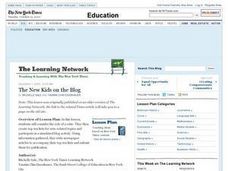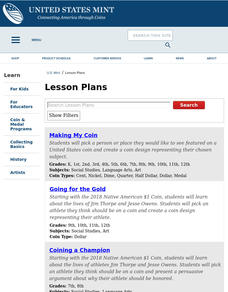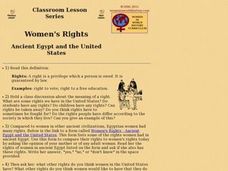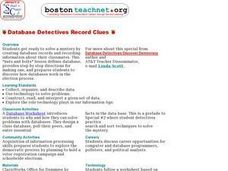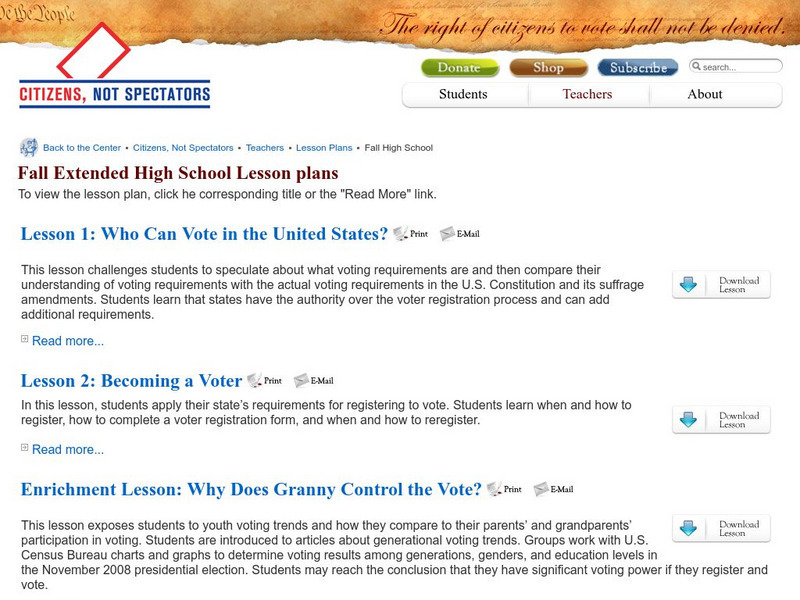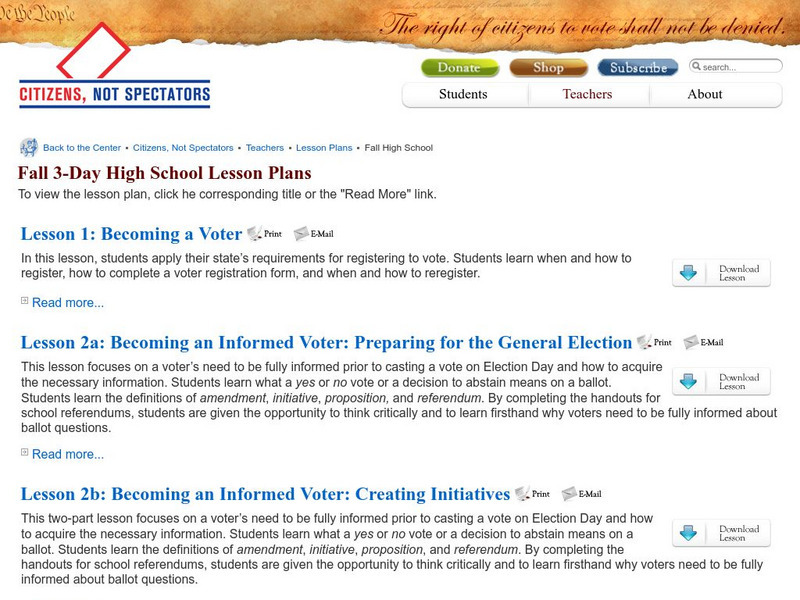Curated OER
Rain and Our Environment
First graders understand the importance of rain in our environment by writing a sentence about something in existence that would cease to be without rain. They use describing words to describe the living thing's color and draw and color...
Curated OER
What's Your Favorite Planet?
Fourth graders interpret a graph and make correlations using data. After taking a class survey, 4th graders create a class graph of their favorite planets. Working in small groups, they interpret the information and create at least ten...
Curated OER
State of Oregon v. Dominguez-Martinez
High schoolers are introduced to the concept of racial profiling. In groups, they analzye the case between Oregon and Dominguez-Martinez and evaluate the use of racial profiling as a tool of policemen. They also discuss the laws in place...
Curated OER
House Bill No. 4097
Students identify healthy and unhealthy foods while considering a bill that would ban certain foods in schools. Through survey and discussion, they discuss a proposed legislative bill that would ban certain types of food in schools....
Curated OER
Who Can Influence Legislators?
Students identify four influences that affect how a Member of Congress decides to vote on a bill, and describe ways that individuals and groups influence legislators.
Curated OER
The New Kids on the Blog
Learners consider the role of a critic by creating top ten lists for arts-related topics and participate in a simulated blog activity. They write newpaper articles to accompany their top ten lists and submit them for publication.
Curated OER
Do You Have a Coin Collection?
Learners create a graph showing which students in the class collect coins.
Curated OER
Christmas Tree Farming in Ontario
Students realize that Christmas trees produced in Ontario are a field crop that is harvested annually. They find out that Christmas tree farming is important to the economy and the environment of our province.
Curated OER
Phil's Fish Shop
Students role play the role of new employees in a pet shop. They offer advice to customers and answer their questions about pets. Using the internet, they identify the steps in establishing a new fish aquarium and summarize the...
Curated OER
Who Says?
Students evaluate websites for scientific accuracy and usefulness. They explore various content evaluation criteria and observe a demonstration on evaluating web sites. They select and evaluate a website for its content information on a...
Curated OER
M&M Statistics
Pupils determine the difference between guessing and making a prediction. They discuss what they could graph using a bag of M&M's. They take a Raw data sample and convert it into a sample. They graph the actual results and combine...
Curated OER
Electronic Elections
Learners evaluate the role of voting in democratic societies and the potential of voting on the Internet.
Curated OER
And Now, the News from Iraq
Students consider the challenges facing Iraqi voters and various attitudes toward the election. They research topics related to the January 2005 election, then write segments for a television news hour.
Curated OER
Underground Railroad
Students research and discuss the use of the Underground Railroad by fugitive slaves. They debate the actions of abolitionists and slave owners according to the laws of the time, create drawings and write narratives.
Curated OER
Women's Rights Ancient Egypt and the United States
High schoolers explore the rights of women in the United States and ancient Egypt. Comparisons between the two eras and countries are made as the wealth, business, marriages, court cases, divorces, and employment of women are probed.
Curated OER
Database Detectives Record Clues
Students collect and organize data from their classmates. They create a database of the information and analyze it. They discuss the role technology has in the world today.
Curated OER
Hazelwood v. Kuhlmeier
Students read the case text of the Hazelwood v. Kuhlmeier case. Using the text, they discuss the case history and the implications of the verdict. They share their findings with the class in the form of a PowerPoint presentation and...
Curated OER
Whose Business Is It?
Students read articles in The Times Business Day section and share their opinions on the articles. They search through the Business Day section of The Times to find items to complete a scavenger hunt. They summarize a teacher selected...
Center For Civic Education
Center for Civic Education: Fall 5 Day Brief Lesson Plans on Voting
A set of brief lessons on voting. Topics covered include voting requirements, registering to vote, voting trends, voter self-education, setting up a polling station, and simulating an election polling site that coincides with a real fall...
Center For Civic Education
Center for Civic Education: Fall Extended Lesson Plans on Voting
An in-depth set of lessons on voting. Topics covered include voting requirements, registering to vote, voting trends, voter self-education, setting up a polling station, and simulating an election polling site that coincides with a real...
Center For Civic Education
Center for Civic Education: Fall 3 Day Lesson Plans on Voting
A set of three lessons on voting. Topics covered include voter registration, educating oneself prior to voting, and simulating an election in class that coincides with a real fall election. All lessons can be downloaded.
iCivics
I Civics: The Poll Picture (Infographic)
Use this infographic to show the process of surveying from pollster to prediction. Students will engage with the concept of sampling and gain a better understanding of the purpose of public opinion polls.
Better Lesson
Better Lesson: Survey Skills: Assessment
Today we become Gallup Poll central as students take a set of collected data and create a visual representation using the skills that have been taught over the past few lessons.
Better Lesson
Better Lesson: Representing Our Own Surveys
After developing a survey questions and polling their classmates (in yesterday's lesson), 1st graders will now find a way to represent their findings and write a statement about what they noticed.







